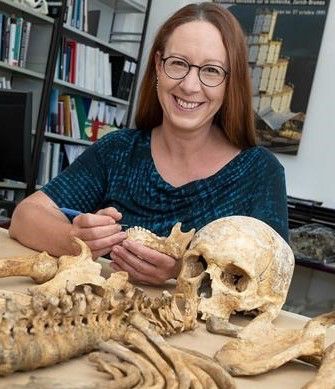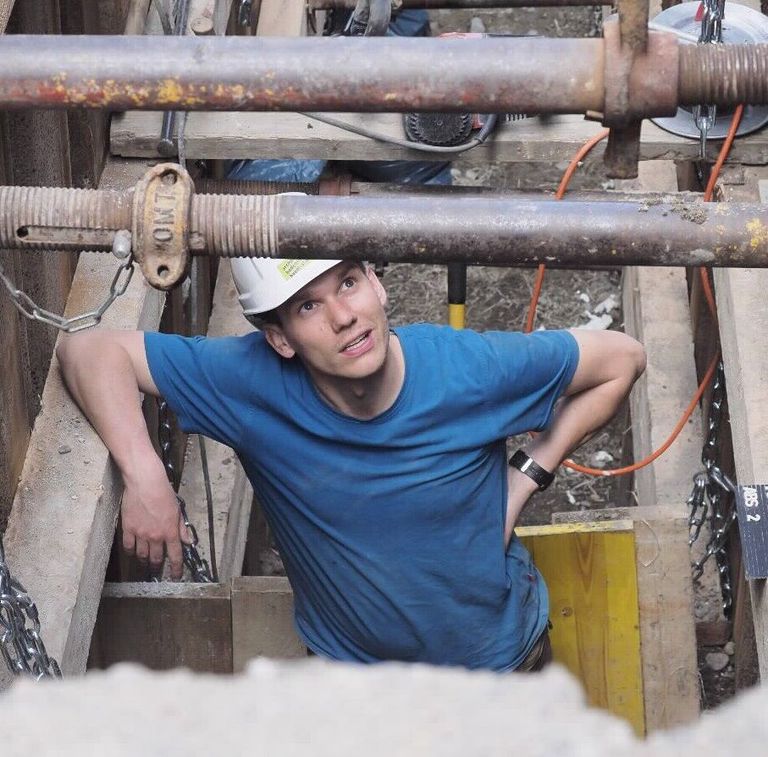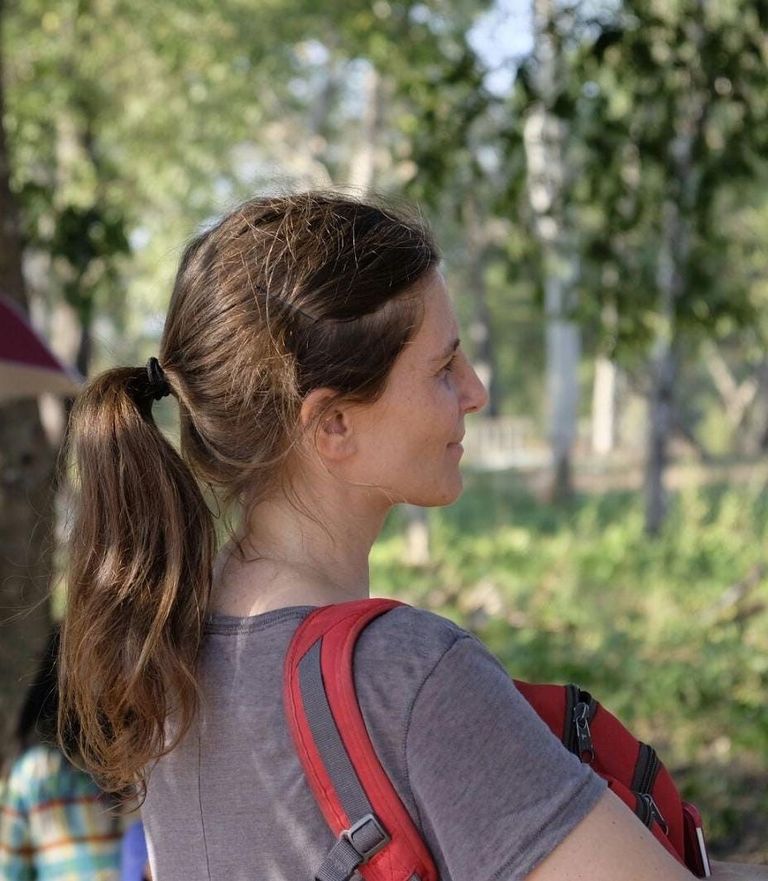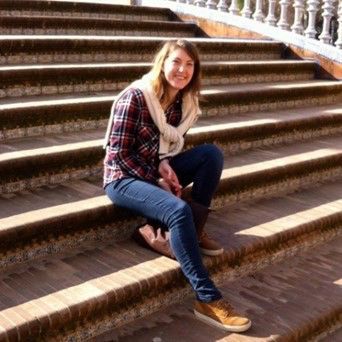Vorstand
Der Vorstand setzt sich für eine Amtszeit von drei Jahren zusammen. Die letzten Wahlen fanden im Jahr 2021 statt.

Präsidentin
Sandra Lösch
Sandra studierte Biologie mit Hauptfach Anthropologie und Humangenetik an der Ludwig-Maximilians-Universität München (LMU) in Deutschland. Sie promovierte 2009 am Institut für Rechtsmedizin der LMU mit einer Arbeit über ein mittelalterliches Skelettkollektiv aus dem alpinen Bayern. Seit 2010 leitet sie die Abteilung Anthropologie am Institut für Rechtsmedizin und habilitierte im Jahr 2019 an der Medizinischen Fakultät der Universität Bern. Ihr Team bearbeitet menschliche Überreste auf Ausgrabungen und im Labor, und betreuen kantonale und internationale Grabungen. Ferner leitet sie wissenschaftliche Projekte und lehrt an der Fakultät für Medizin, der Philosophisch-Historischen Fakultät und der Fakultät für Rechtswissenschaften. Sie betreut Masterstudierende und Doktorierende der Universität Bern und fungiert als Gutachterin für Abschlussarbeiten internationaler Universitäten, für peer-review Journale, wie auch für internationale Forschungsförderungsorgane.
Forschungsschwerpunkte: Forensik, Bioarchäologie, Ernährung, Mobilität, Paläopathologie, Ur- und Frühgeschichte, Leben im alten Ägypten
https://orcid.org/0000-0003-3442-9764

Vizepräsidentin
Christine Cooper
Christine hat in Zürich Anthropologie studiert. Sowohl ihre Master- (2003) als auch ihre Doktorarbeit (2010, Johannes Gutenberg-Universität Mainz) befassten sich mit Traumata an Gefallenen mittelalterlicher und neuzeitlicher Schlachten. Von 2004 bis 2010 war sie wissenschaftliche Mitarbeiterin an der Universität Bern (Arbeitsgruppe Anthropologie am Institut für Medizingeschichte). Seit 2010 ist sie als Anthropologin beim Amt für Kultur / Archäologie im Fürstentum Liechtenstein angestellt und ist weiterhin an der Universität Bern tätig (Abteilung Anthropologie, Institut für Rechtsmedizin).
Forschungsschwerpunkte: Paläopathologie, Osteoarchäologie, Bestattungssitten, ur- und frühgeschichtliche bis neuzeitliche Bevölkerungsgruppen
https://orcid.org/0000-0001-7904-808X

Sekretär
David Roth
David studierte Prähistorische und Naturwissenschaftliche Archäologie sowie Ur- und Frühgeschichte an der Universität Basel. Er schloss seinen Master in Archäoanthropologie im Jahr 2019 ab. In seiner Masterarbeit untersuchte er taphonomische Veränderungen und perimortalen Gewalteinwirkungen an neolithischen Skeletten aus der El Trocs Höhle in den Pyrenäen. Seit 2020 arbeitet er bei der Archäologischen Bodenforschung Basel-Stadt als Anthropologe und Technischer Grabungsleiter. Momentan betreut er die Grossgrabung in der Freie Strasse. Zusätzlich unterstützt er das Naturhistorische Museum Basel. Die praktische Anwendung der physischen Anthropologie auf archäologischen Grabungen und Verbindung zwischen Feldanthropologie und Feldarchäologie sind ihm ein wichtiges Anliegen.
Forschungsschwerpunkte: Physische Anthropologie, Traumatologie, Interdisziplinäre Verbindung von Archäologie und Anthropologie

Kassierin
Jocelyne Desideri
Jocelyne hat an der Universität Genf in der Sektion Biologie prähistorische Archäologie mit dem Schwerpunkt Bioanthropologie studiert. Ihre Forschung hat sich seither im Rahmen interdisziplinärer Projekte entwickelt, die sich hauptsächlich mit den Lebensstilen und der Dynamik der Bevölkerung in der Vergangenheit aus einer bioanthropologischen Perspektive befassen. Im Rahmen ihrer akademischen Laufbahn spezialisierte sich Jocelyne sowohl für ihre Masterarbeit (2001) als auch für ihre Doktorarbeit (2007) schnell auf die Dentalanthropologie. Nach und nach hat sie neue Methoden in ihre Forschung integriert. Nach einer Ausbildung in aDNA-Analyse am aDNA-Labor der Lakehead University (Kanada) absolvierte Jocelyne 2008-2009 einen Postdoc im Labor für Archäologische Chemie der University of Madison (USA). Heute ist sie Dozentin und wissenschaftliche Assistentin am Institut für Genetik und Evolution der Universität Genf. Seit 2013 besteht ihre Hauptaufgabe darin, die Forschung in der Bioanthropologie weiter zu entwickeln, insbesondere durch die Ausbildung der nächsten Generation von Studenten (Bachelor, Master und PhD). Neben dem Unterricht in Bioanthropologie leitet sie jedes Jahr zwei Feldschulen (Albanien und Bulgarien), um die Studierenden mit der Grabarchäologie vertraut zu machen.
Forschungsschwerpunkte: Bioanthropologie, menschliche Osteologie, biologische Identifikation des Skeletts, Dentalanthropologie, Isotopen-Geochemie, Bevölkerungsdynamiken, Mobilität, Lebensweisen, Paläoernährung, prähistorische und historische Epochen, Grab-Archäologie, Europa, Afrika

Chief Editor
Claudine Abegg
Claudine Abegg hat ihren Master in forensischer Archäologie und Anthropologie an der Cranfield University in England abgeschlossen. Danach forschte sie im Rahmen ihres PhDs zum Gesundheitsstatus von neolithischen Populationen in der Westschweiz, insbesondere untersuchte sie paläopathologische Läsionen in zugänglichen Gräberfeldern der Region - und hat 2019 erfolgreich verteidigt.
Anschliessend arbeitete sie als forensische Anthropologin am Centre Universitaire de Médecine Légale (CURML) Lausanne-Genève bis 2023. Seit 2024 forscht Claudine im SNF-Projekt von Professor Marie Besse zu (Kunst-)Handwerkern während der Glockenbecherkultur in der Region um den Mont-Blanc. Parallel dazu arbeitet Claudine als freie Anthropologin für den Kanton Waadt und führt anthropologische Untersuchungen im Kontext von geplanten Feld- oder Provenienz-Studien durch.
Forschungsinteressen: Paläopathologie, Osteologie Sammlungs-Management, Ethik in physischer Anthropologie, Neolithikum

Webmaster
Timea Remsey
Timea studierte Prähistorische und Mittelalterarchäologie im Bachelor an der Universität Zürich und schloss anschliessend einen Master in Bioarchäologie an der Durham University ab. In ihrer Masterarbeit analysierte sie prä- und postnatale Isotopensignale in Milchzähnen in Kombination mit paläopathologischen Befunden, um Rückschlüsse auf die mütterliche sowie frühkindliche Gesundheit zu ziehen.
Seit 2021 ist sie bei der Kantonsarchäologie Zürich angestellt und arbeitet als Anthropologin und Projektleiterin, wo sie unter anderem das Grossprojekt zum neuzeitlichen Zürcher Spitalfriedhof leitete. Seit 2025 arbeitet sie ausserdem bei der Kantonsarchäologie Schaffhausen und hat dort die anthropologische Leitung auf der Grossgrabung zum ehemaligen Siechenhaus auf der Steig.
Forschungsschwerpunkte: Paläopathologie, Stabile Isotopen, Developmental Origins of Health and Disease (DOHaD), Spitalgeschichte Mittelalter und Neuzeit